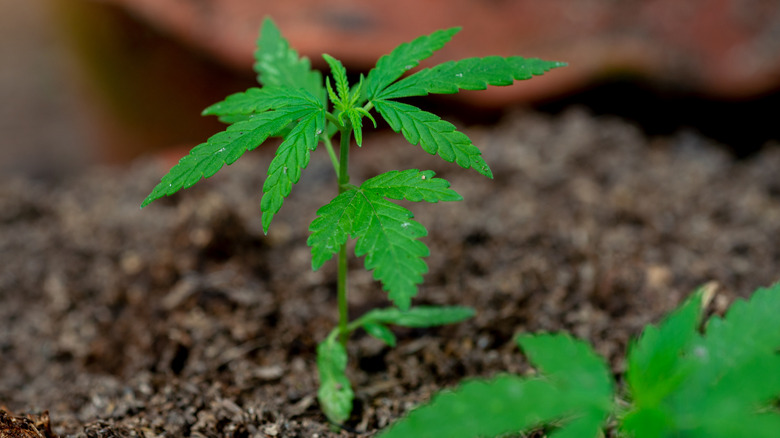Can Marijuana Increase Your Risk Of Developing Psychiatric Disorders?
Legalized recreational marijuana is popping up all over the United States. Currently, cannabis is legal in two U.S. territories, 19 states, and the District of Columbia, according to the National Conference of State Legislatures. Could this inadvertently contribute to an increase in mental health problems?
An increased risk of psychiatric disorders, anxiety, and depression has been linked to marijuana usage, points out the National Institute on Drug Abuse (NIDA). This includes psychosis and schizophrenia. However, researchers are still investigating whether, how, and why marijuana usage causes these conditions.
One possible factor is the potency of marijuana, specifically the THC which has psychoactive effects. For instance, 20 years ago, one joint typically contained 5% THC (via NBC News). Grab some newer marijuana products in 2022 and you may be looking at THC levels up to 90%.
A 2019 study compared non-cannabis users with daily cannabis users who used high-potency marijuana. Compared to non-cannabis users, researchers found that people who used high-potency marijuana on a daily basis had a fourfold increased risk of developing psychotic disorders. A psychiatry professor at Yale University School of Medicine, Dr. Deepak Cyril D'Souza explains that legalization isn't to blame, but that there should be restrictions on THC levels and warning labels to advise consumers of the risk (via NPR).
What else contributes to psychosis and how do you spot it?
While NPR reports that California may soon require cannabis products to have warning labels for mental health risks, it turns out that high-potency cannabis isn't the only factor that may increase the odds of psychiatric disorders. While the exact determinants of psychiatric disorders are still being determined, researchers agree that trauma, genetics, family history, and environment all play a role.
Researchers believe the AKT1 gene, which manages an enzyme that's responsible for signaling the neurotransmitter dopamine, may play a role in the development of psychosis (via NIDA). When dopamine signaling becomes altered via daily marijuana usage, those who have a specific variant of this gene have a higher risk of developing psychosis. According to Healthline, symptoms of psychosis include hallucinations and delusions. Schizophrenia symptoms include psychosis, cognitive problems, and more.
In a study published by Biological Psychiatry, variants of the gene catechol-O-methyltransferase (COMT) also increase the risk of psychosis in adults who used marijuana during adolescence. According to NIDA, COMT is an enzyme that manages the breakdown of norepinephrine and dopamine.
When it comes to psychotic disorders in general, Dr. D'Souza points out cannabis can amplify issues, oftentimes leading to more hospitalizations and legal woes (via NPR).
If you or someone you know is struggling with mental health, please contact the Crisis Text Line by texting HOME to 741741, call the National Alliance on Mental Illness helpline at 1-800-950-NAMI (6264), or visit the National Institute of Mental Health website.


